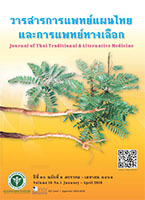Effects of Tai Chi Exercise Promotion Program for Knee Pain Relief among Elderly with Osteoarthritis in Thai Traditional and Integrated Medicine Hospital, Bangkok
Main Article Content
Abstract
Bone and joint diseases especially osteoarthritis of the knee among elderly persons are increasingly an important problem in the Thai health system. This research aimed to assess the effects of the “tai chi” exercise promotion program for relieving knee pain in elderly patients with osteoarthritis at the Thai Traditional and Integrated Medicine Hospital in Bangkok using the self-efficacy theory and a quasi-experimental, two-group pretest-posttest research design. The participants were 46 elderly patients with knee osteoarthritis at the Knee Osteoarthritis Clinic of the hospital, 23 each in the experimental and comparison groups. The study was carried out for 6 weeks. In the first week, the activities included providing information about knee osteoarthritis and tai chi exercise to enhance the experimental group’s
perceived self-efficacy; demonstration and practices of three tai chi exercise postures (Tawan Berkfah, Pai-ruea Klangnam and Mekkhala Lor-klaew) using a VDO media. In the second week, there were reviews of the three tai chi postures using live models selected from the group, opinion exchanges, encouragement and admiration. The activities in the third and fifth weeks included telephone stimulation, follow-up, questioning and experience sharing. The fourth week involved exercise evaluation and recommendations; and the sixth week included data collection using an interview form and an observation form. Data were collected using a questionnaire and an observation form; and then analyzed to determine mean and percentage and to perform independent t-test, chi-square test and paired sample t-test. The comparison group got a manual on tai chi exercise and received normal services provided by the hospital. The results showed that after the experimentation, the experimental group had significantly higher levels of knowledge, perceived self-efficacy, outcome-expectation of pain relief and tai chi exercise practices, compared with those in the comparison group (p < 0.001) and a significantly decreased level of knee pain (p < 0.001). Thus, the benefits of tai chi exercise for knee pain relief among elderly patients with knee osteoarthritis should be widely promoted.
Article Details
References
2. Saenverm S, Dokhan K. The Preparation for the Aging Society in the Next 5 Years. The 2nd National Conference on Public Affairs Management; 7 August 2014; College of Local Administration, Khon Kaen University. Khon Kaen: 2014. 91 p. (in Thai)
3. Prasatkul P. Situation of the Thai elderly 2013. Bangkok: Amarin Printing & Publishing Public Co., Ltd; 2014. 125 p. (in Thai)
4. Suwanasoon P. Future of Thai for the aging society. Research and Development Newsletter. 2014;13(114):18-23. (in Thai)
5. Wongwuttiwat P. How do the preparation for the aging society?. Matichon 2009 Feb 28 (in Thai)
6. Singha S, Durongritichai V, Surapan J, Kasipon T, Khungtumneum K. Factors affecting to self-care behavior of the elderly with knee osteoarthritis in Praksa municipality area, Muang district, Samutprakarn province. HCU journal of health science. 2015;18(36):115-30. (in Thai)
7. Chaiamnuay P. Epidemiology of rheumatic arthritis. [Internet]. 2015 [2016 Nov 20]; Available from: https://www.thaiarthritis.org/people23.php (in Thai)
8. Thai Traditional and Integrated Medicine Hospital. Medical record of out-patient department with osteoarthritis. 2016 Nov 18; Thai Traditional and Integrated Medicine Hospital. Bangkok: 2016. (in Thai)
9. Poonsuk P, Kengganpanich M, Kengganpanich T, Benjakul S. The effects of knee exercise promotion program with “Rue Si Dat Ton” for knee pain relief among osteoarthritis patients. Journal of public health. 2016;46(2):191-202. (in Thai)
10. Yip YB, Sit JW, Wong DY, Chong SY, Chung LH. A 1-year follow-up of an experimental study of a self-management arthritis programme with an added exercise component of clients with osteoarthritis of the knee. Psychol Health Med. 2008;13(4):402–14.
11. Pukdeesamai R. Improving care for elderly with knee pain at ban bak tambol health promotion hospital, Changhan district, Roi Et province. Journal of nursing science and health. 2011;34(4):46-55. (in Thai)
12. Department of Thai Traditional and Alternative medicine, Department of Health Service support Ministry of public health. Caregiving to older for Integration. 6th ed. Bangkok: The War Veterans Organization of Thailand under Royal Ratronage of His Majesty the King; 2012. 49 p. (in Thai)
13. Kaweeworawut C. Tai Chi. Bangkok: MIS Publishing Co., Ltd.; 2007. 51 p. (in Thai)
14. Bandura A. Self-efficacy. 13th ed. United States of America: R R Donnelley & Sons Company; 1997. 604 p.
15. Bloom B. Human characteristics and school learning. New York: McGraw-Hill Book Company; 1976. 284 p.
16. The Institute of Thai Traditional Medicine, Department of Thai Traditional and Alternative Medicine. Practice guidelines of Thai Traditional and Alternative Medicine service. Bangkok: Samcharoen Panich; 2016. 107 p. (in Thai)
17. Maly MR, Costigan PA, Olney SJ. Self-efficacy mediates walking performance in older adults with knee osteoarthritis. J Gerontol A Biol Sci Med Sci Med Sci. 2007;62(10):1142-6.


